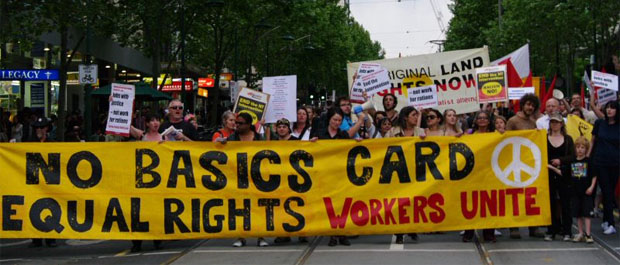On October 20, Gurindji workers in the remote Aboriginal communities of Kalkaringi and Dagaragu stopped work in protest against the NT intervention. This protest revives the memory of the Gurindji walk-off in 1966, which was central in sparking a wave of protest and solidarity that led to the land rights victories of the 1980s.
The strike is part of the growing resistance to government policies that are forcing Aboriginal communities back to the “ration days” and the stripping away of Aboriginal control over land and communities that was won through past struggles.
Through the NT intervention, the federal government took control of Aboriginal township land through five-year leases. This enabled the NT government to abolish Aboriginal community councils and set up nine “mega-shire” councils. All assets of the community councils were seized and handed to these new shires.
Attack on jobs
The community councils had employed Aboriginal people, largely through Community Development Employment Projects (CDEP). The CDEP program was introduced in 1977, ostensibly to create Aboriginal employment, but was never adequately funded and operated in effect as work for the dole. Rather than fund the employment programs adequately, the NT intervention policies have moved to cut Aboriginal employment by scrapping CDEP programs that were previously run through the community councils.
Cutting the CDEP programs without creating real jobs has meant many communities are not getting basic work done, like rubbish collection, school pick-ups or sewerage maintenance. Meanwhile, outside contractors are being brought into communities by the mega-shires to do work that should be employing people in the Aboriginal communities.
New CDEP programs created by the mega-shires are nothing short of slave labour – work for rations. Workers under the mega-shire CDEP schemes are not paid wages, even if they work full time. They receive only a Centrelink Newstart payment, with half their payment on the basics card. These workers are being told they will be cut off Centrelink entirely if they do not do as the shire directs.
CDEP workers are working 16 hour weeks for $115 cash and $115 on a ration card (the NT Intervention’s “basics card”, which can be used to buy only certain items at designated stores). Workers have no basic entitlements such as leave or superannuation. There is no allowance for leave for cultural business or ceremony.
A spokesperson for the Gurindji strike, John Leemans, said in a media statement on October 20: “Prior to the Intervention we had nearly 300 CDEP workers employed in municipal services, construction and maintenance roles. When the government took over and abolished the community council and CDEP everything came to a halt. We went two years without regular rubbish collection because the truck was seized. Houses and buildings are in desperate need of repair but there’s no funding for workers or materials.
“If you go out to Dagaragu you’ll see the evidence these cuts have had on our people. Everything we built has gone – the old CDEP office, the brick making shed, the nursery, the health clinic, the old family centre. Soon we may lose the bakery. Houses that are now under Territory Housing control are overcrowded and falling apart. The damage is just overwhelming.
“We now have around 40 workers left on CDEP and training programs. Many are working 35 hour weeks but under the new laws they’re working for nothing but a Centrelink payment. It’s worse than working for the dole, because half goes onto the BasicCard and can only be spent at approved stores. History is being repeated here, with our people forced to work for rations again.”
According to the Alice Springs Intervention Rollback Group, in the community of Ampilatwatja there are cases of people working 25-40 hour weeks; that’s $4-11 an hour plus rations. Young people are being told that there is no paid work for them within the shire and that if they want wages, they will have to leave the community.
In October there was an east coast tour of an Aboriginal man, Mark Fordham, who spoke to public meetings, unions and workplace meetings about these conditions and the reality in the NT Aboriginal communities. Fordham worked as the shire works manager at Ampilatwatja until he was sacked for refusing to dump illegally 3000 litres of raw sewerage at the local tip. He also faced criminal charges for speaking out and was kicked out of his house where he lived with his two sons, with only two hours notice, and told he could not return to the Barkly shire region.
Fordham presented a powerful indictment of the complete failure of government policy to provide any training or employment opportunities for people in Aboriginal communities. At a 50-strong public meeting in Brisbane, Fordham described the NT intervention policies as “another form of genocide”. The facts presented at these meetings swept aside the government rhetoric about the intervention, which Fordham described as “sugar-coated racism”.
Fordham told the meeting that behind the policies was a drive to remove Aboriginal people from the communities and land. “Governments have always wanted us out of there. What’s under our feet is a lot of money in minerals.”
A national statement as part of the “Jobs with Justice” campaign was launched on October 29 to coincide with rallies being held across the country. The statement, which received wide support from unions and campaign groups, calls for:
- a guarantee of 500 shire jobs currently under threat
- the end of compulsory income management
- an end to CDEP schemes forcing people to work for the “basics card”
- turning all CDEP positions into fully waged jobs
- massive investment in job creation and service provision in Aboriginal communities.
For more information, see Jobs with Justice and Rollback the Intervention.

